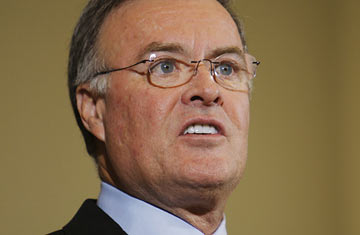
Bank of America Chief Executive Officer Ken Lewis speaks at the Boston College CEO club luncheon in Boston, Mass.
On Monday, the bank agreed to pay $33 million to settle Securities and Exchange Commission charges that Lewis and other executives misled the bank's investors prior to its $50 billion purchase last year of brokerage firm Merrill Lynch. In a separate development on Monday, the bank also announced that it had hired Sallie Krawcheck, a former top Citigroup executive, to run the Merrill Lynch brokerage division as part of a management shake-up. Observers say the move frees up Brian Moynihan, who had been in charge of Merrill's divisions and has long been thought to be Lewis' successor, to take on a larger role at the bank. Krawcheck, a former chief executive on Wall Street, is also a possible contender for the top job.
"Clearly, we think the SEC settlement is further evidence that Lewis should go," says Sevice Employees International Union Stephen Lerner, who heads SEIU's financial-reform campaign. "It is extraordinary that Lewis has remained this long under these circumstances."
Lewis has said that he would like to stay on as CEO of Bank of America until his firm is able to repay the $45 billion it received in government assistance during the financial crisis. Some money managers say that could take years — and it looks increasingly unlikely that Lewis will be able to hang on that long. In April, shareholders voted to strip Lewis of the title of chairman. Moreover, regulators have pushed the bank to replace a number of its corporate directors. The SEC settlement may be the final straw for Lewis.
"It's very rare when you split the chairman and CEO position for the top executive to stay in place," says Paul Miller, who follows Bank of America at FBR Capital Markets. The executive's performance during the financial crisis has come under increasing scrutiny in the past few months. At the center of the criticism, and the SEC complaint, is the way Lewis handled the Merrill Lynch acquisition. Lewis and his executives hammered out the details of the multibillion deal to buy Merrill over the course of a single weekend during the worst of the financial crisis. Quickly, it became apparent that Merrill Lynch was in much worse shape than Lewis had suspected. Worrying that the deal would cripple his bank, Lewis was forced to ask the Treasury Department for $20 billion in additional financial support to complete the deal.
The SEC complaint, which was filed Monday, alleges that Lewis misled shareholders in advance of the Merrill acquisition, withholding information that might have caused investors to vote against the acquisition he wanted. In a proxy statement sent to shareholders prior to the vote on the deal, Bank of America stated that Merrill had agreed not to pay bonuses to its top executives until after the acquisition was closed. Shortly after completing the acquisition, Lewis fired Merrill's top executive John Thain for, among other things, paying out $3.6 billion in bonuses to Merrill's top executives just days before the Bank of America acquisition was complete.
But according to the SEC complaint, Lewis and other Bank of America executives had full knowledge of Merrill's plans to pay out bonuses to top executives. In fact, prior to sending out the proxy statement, the complaint asserts, Bank of America had agreed to let Merrill pay out as much as $5.8 billion in year-end bonuses, a little over $2 billion more than Thain actually paid out. In settling the SEC complaint — paying the fine — Bank of America neither confirmed nor denied the charges.
Investors, however, aren't inclined to stay neutral. "Lewis used the bonus issue to get rid of Thain," says Jonathan Finger, an institutional investor who owns shares in Bank of America and has been pushing for Lewis' ouster. "But this shows that Lewis knew about it all along."
Even if Lewis holds on this his job, the hiring of Krawcheck underscores the fact that Bank of America has a growing honesty issue with shareholders. Krawcheck has a reputation on Wall Street as being Ms. Clean. Fortune magazine (TIME and Fortune share the same publisher) once dubbed Krawcheck the "last honest analyst" on Wall Street.
"The SEC settlement demonstrates the lack of regard Lewis and the former Bank of America board has for shareholders," says Finger. "They were not as open as they should have been."
